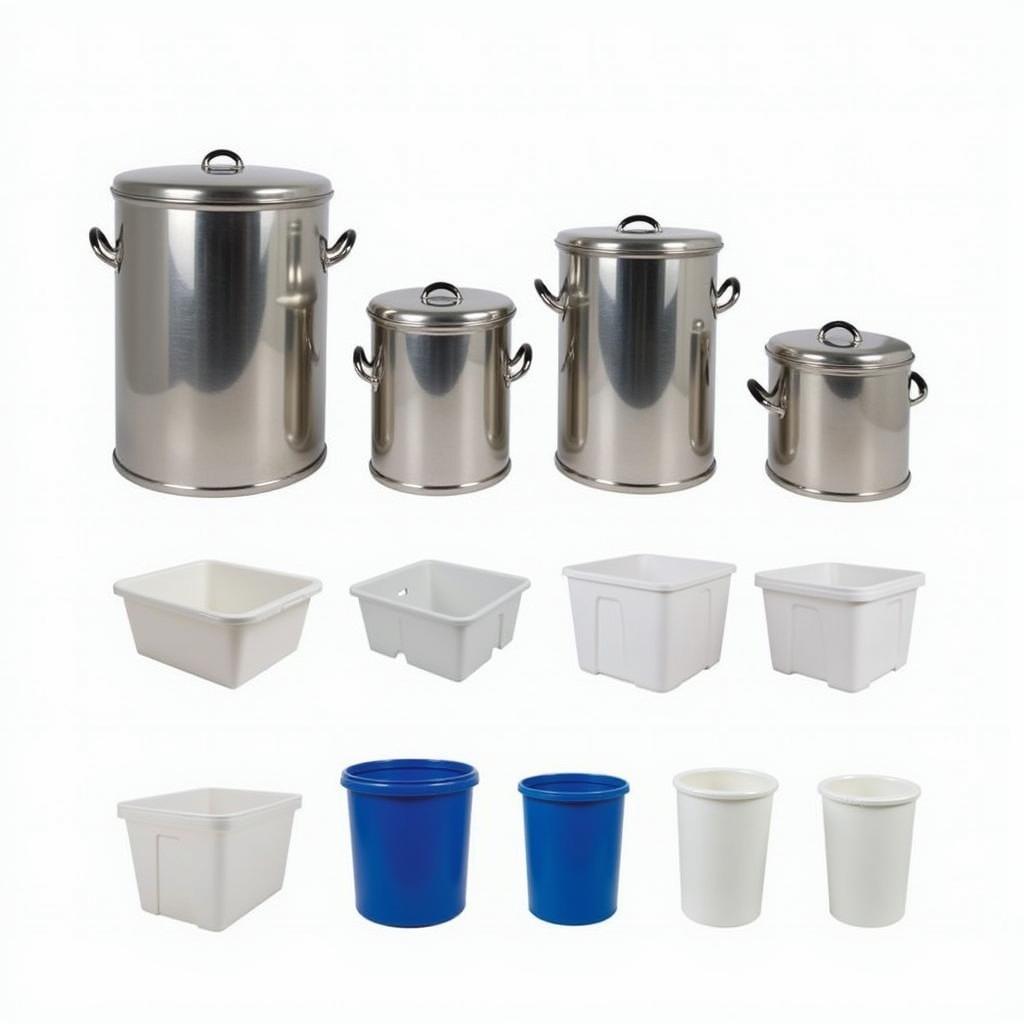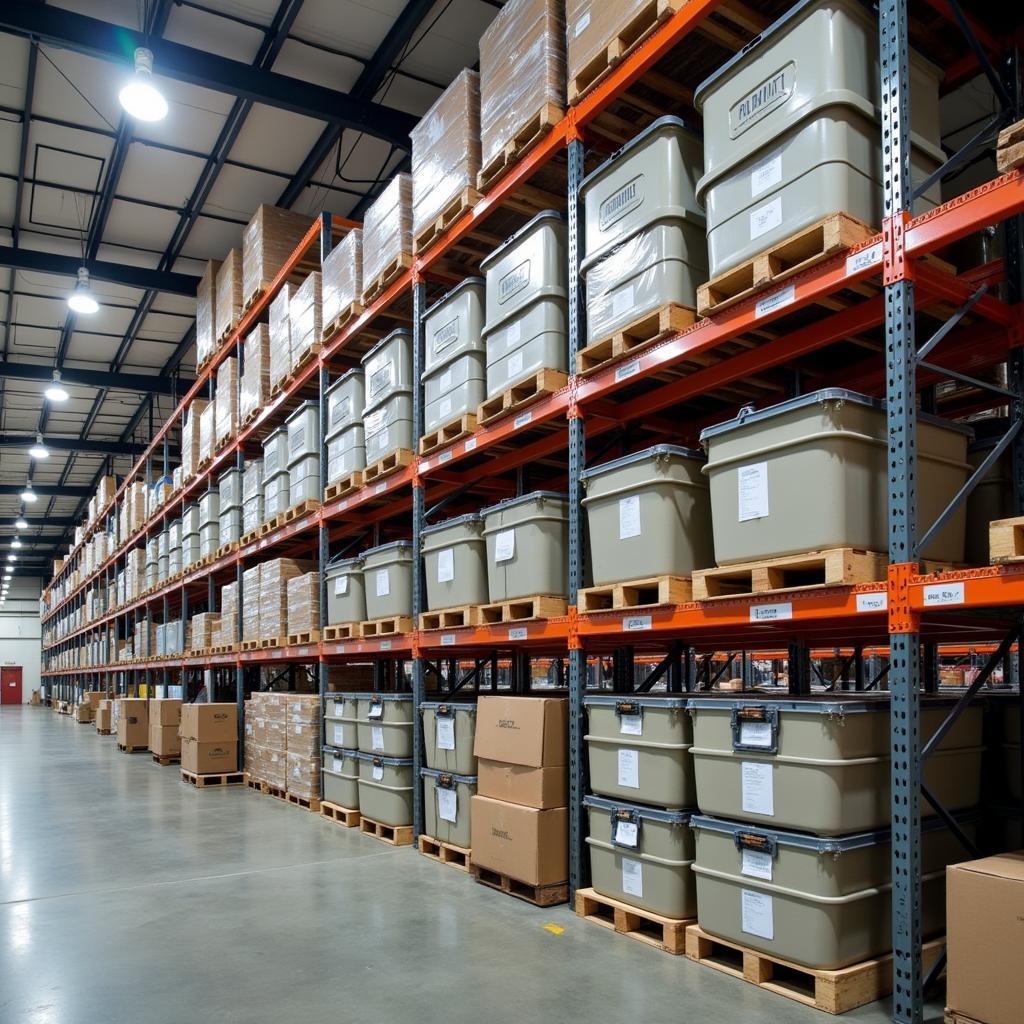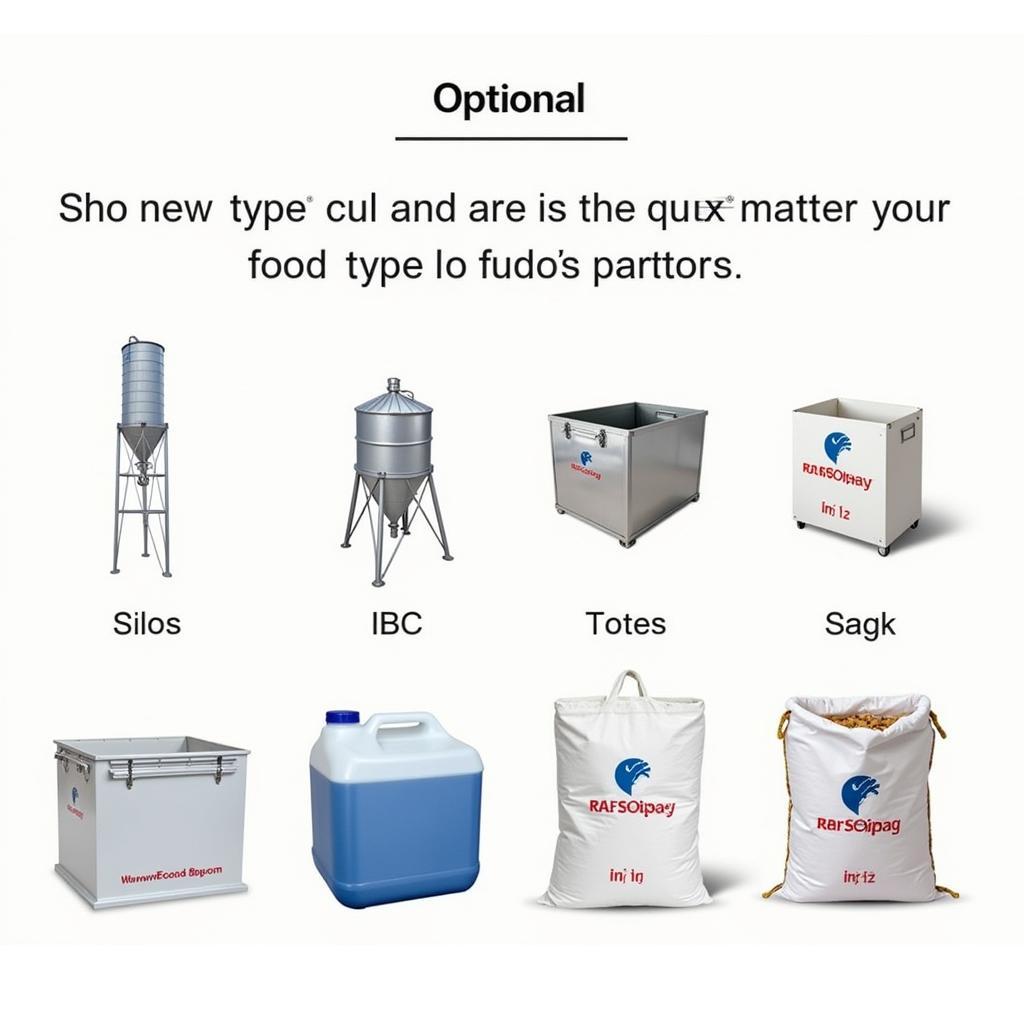Industrial Food Storage Containers are essential for maintaining the quality and safety of food products throughout the supply chain. Whether you’re a small bakery or a large-scale food processing plant, choosing the right storage solutions can significantly impact your operations. This article dives deep into the world of industrial food storage containers, exploring various types, materials, and best practices to help you make informed decisions. We’ll cover everything from choosing the right size container to maintaining hygiene and optimizing storage space. Check out our food grade totes for some excellent options.
Choosing the Right Industrial Food Storage Container
Selecting the appropriate industrial food storage container depends on a variety of factors. Consider the type of food you’re storing, the required storage capacity, and the environmental conditions. Different materials offer different benefits, such as durability, temperature resistance, and chemical inertness.
Understanding Different Material Options
- Stainless Steel: Known for its durability and resistance to corrosion, stainless steel is ideal for storing a wide range of food products. It’s easy to clean and maintain, making it a hygienic choice.
- High-Density Polyethylene (HDPE): A popular choice for its lightweight nature and impact resistance, HDPE is often used for food grade totes and bulk storage containers.
- Polypropylene (PP): Similar to HDPE, polypropylene offers excellent chemical resistance and can withstand higher temperatures. It’s often used for containers intended for hot filling or pasteurization processes.
Sizing Up Your Storage Needs
Choosing the correct size is crucial for optimizing storage space and minimizing waste. Consider your projected storage volume and the available space in your facility. Using food processing supplies can help streamline your operations and maximize efficiency.
 Various Industrial Food Storage Containers for Diverse Needs
Various Industrial Food Storage Containers for Diverse Needs
Maintaining Hygiene and Safety in Industrial Food Storage
Maintaining proper hygiene is paramount in food storage. Regular cleaning and sanitization are crucial to prevent contamination and ensure food safety.
Cleaning and Sanitization Best Practices
- Establish a regular cleaning schedule: Frequent cleaning is essential to remove food residue and prevent bacterial growth.
- Use appropriate cleaning agents: Choose cleaning solutions that are safe for food contact surfaces and effective against common foodborne pathogens.
- Implement a thorough sanitization process: After cleaning, sanitize containers with approved sanitizers to eliminate any remaining microorganisms.
- Ensure proper ventilation: Adequate ventilation helps prevent moisture buildup, which can lead to mold and bacterial growth. See our range of eco food containers for sustainable options.
Optimizing Storage Space and Efficiency
Efficient storage practices can significantly impact your bottom line. Maximizing space utilization and minimizing handling time can improve productivity and reduce costs.
Space-Saving Strategies
- Vertical stacking: Utilize vertical space by stacking containers whenever possible. Ensure containers are designed for safe stacking to prevent accidents.
- Pallet racking: Install pallet racking systems to create organized storage areas and maximize vertical space.
- First-In, First-Out (FIFO) inventory management: Implement a FIFO system to ensure that older stock is used first, minimizing the risk of spoilage.
“Effective storage solutions are not just about containers; they’re about creating a system that optimizes the entire food handling process,” says Dr. Amelia Carter, Food Safety Consultant at FoodSafe Solutions Inc.
 Optimizing Warehouse Storage with Industrial Food Containers
Optimizing Warehouse Storage with Industrial Food Containers
What are the Different Types of Industrial Food Storage Containers?
From bulk storage silos to smaller food grade totes, there’s a container for every need. Understanding the different types available can help you choose the best solution for your specific application. For example, IBC food storage containers offer a convenient solution for transporting and storing liquids.
“Choosing the right container goes beyond just size; material compatibility with your product is crucial for preserving its quality and integrity,” explains David Miller, Senior Packaging Engineer at PackTech Solutions.
Common Types of Containers
- Bulk Storage Silos: Used for storing large quantities of dry ingredients like grains and powders.
- Intermediate Bulk Containers (IBCs): Reusable containers ideal for transporting and storing liquids.
- Food Grade Totes: Versatile containers suitable for a wide range of food products, both solid and liquid.
- Food Sacks: Food sack offer a cost-effective solution for storing dry ingredients.
 Different Types of Industrial Food Storage for Various Applications
Different Types of Industrial Food Storage for Various Applications
In conclusion, selecting the right industrial food storage containers is vital for maintaining food quality, ensuring safety, and optimizing efficiency. By considering factors such as material, size, and hygiene practices, you can create a robust storage system that meets the unique demands of your food business. Remember, investing in the right industrial food storage containers is an investment in the long-term success of your operation.
FAQ
- What is the best material for industrial food storage containers? The optimal material depends on the specific food product and storage requirements.
- How do I clean industrial food storage containers? Use food-safe cleaning agents and follow established sanitization protocols.
- What are the benefits of using IBCs for food storage? IBCs offer a convenient and efficient solution for storing and transporting liquids.
- How can I optimize storage space in my facility? Implement vertical stacking, pallet racking, and FIFO inventory management.
- Where can I find high-quality industrial food storage containers? Mina Cones Food offers a wide selection of food-grade storage solutions.
- What is the lifespan of an industrial food storage container? The lifespan varies based on material, usage, and maintenance.
- How do I choose the right size container for my needs? Consider your projected storage volume and available space.
For further assistance, please contact us at Phone Number: 02437655121, Email: [email protected] or visit our address: 3PGH+8R9, ĐT70A, thôn Trung, Bắc Từ Liêm, Hà Nội, Việt Nam. We have a 24/7 customer service team.